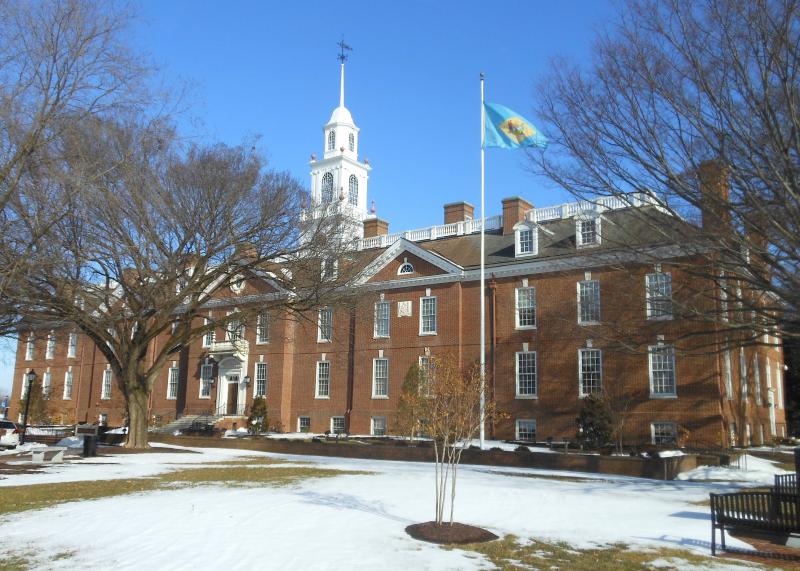Budget talks will dominate legislative session
The second year of the 149th General Assembly began Jan. 9, and Gov. John Carney is using the early days of the session to push legislation in favor of more parental leave for state employees and the Beau Biden Gun Violence Prevention Act.
Meanwhile, Speaker of the House Rep. Pete Schwartzkopf said, as usual, the big issue will be the budget.
"After last year, nobody walked out of here proud," said Schwartzkopf, D-Rehoboth. "We entered an area that we don't ever want to go back to again."
The 2017 legislative session ended July 3 after Delaware lawmakers couldn't agree on how to resolve a $400 million shortfall by midnight June 30. Carney signed a short-term appropriation measure July 1 to fund state government for 72 hours.
Schwartzkopf said credit rating agencies warned it wouldn't take many days before Delaware could see its coveted AAA rating drop. He said the trick to cracking the stalemate was pushing two hot issues – prevailing wage and itemized deductions – into this year.
"Once we got rid of those two issues, it didn't take long," Schwartzkopf said. "We had the basics for an agreement in an hour."
A substantial portion of the shortfall was offset by tax increases including a 1 percent increase in the real estate transfer tax; an increase in the corporate franchise tax; a 50-cent-per-pack increase on cigarettes and other tobacco-related products; a tax increase on beer, wine and spirits; and an across-the-board increase to the filing fees associated with Department of Insurance filings.
Balancing the budget also required reducing the Educational Sustainment Fund; eliminating 200 vacant positions across state agencies; savings in employee health costs; modifying health insurance rates for households with two state employees; and a 20 percent, across-the-board reduction of grant-in-aid to volunteer fire department and nonprofits.
Early revenue reports suggest the changes are working. According to the December year-to-date report from the Delaware Economic and Financial Advisory Council, the state has about $90 million more in anticipated revenue for the next fiscal year, which begins July 1.
Schwartzkopf said he won't start getting excited about the additional revenue until the DEFAC report in May. In 2009, he said, the state went from a $250 million shortfall in December to an $850 million shortfall in May.
"That shows you how volatile revenue can be," he said.
Sen. Ernie Lopez, R-Lewes, said he supports restoring the 20 percent reduction to volunteer fire companies and nonprofits if revenue continues to outpace expenses. The needs that first responders and nonprofits meet are still there, he said.
"It's prudent and responsible," Lopez said.
One thing Lopez isn't feeling the love for is marijuana legalization. A bill legalizing marijuana last year passed through a House committee, but wasn't called to the House floor because it lacked the necessary votes. Instead, a task force to study the issue was created, and a final report is expected in February.
Despite introducing a medical marijuana bill for minors, called Rylie's Law, Lopez said his views on legal recreational marijuana haven't changed.
"I'm still a no," he said.
Rep. Steve Smyk, R-Milton/Lewes, is a member of the marijuana task force. He said he remains unconvinced marijuana should be legalized.
"It's going to be very difficult to come up with a conclusion," said Smyk.
Schwartzkopf said he's still a no on the issue as well as raising U.S. Attorney General Jeff Sessions' early-January decision to lift an Obama-era policy protecting states that have legalized marijuana. Schwartzkopf said if he were at the federal level, he would deal with the states that have already legalized marijuana in due time while coming down hard on the first state to challenge the new policy.
"Does Delaware really want to be the first state?" Schwartzkopf asked.
All three legislators are up for re-election in 2018.
Lopez filed for re-election in December. He said he's received tremendous support since he made his candidacy official.
Schwartzkopf and Smyk said they are both running for re-election, but neither has filed. Smyk already has at least one opponent – Milton Democrat Jack Bucchioni, who filed his paperwork Jan. 11.
"I want anyone who wants to run against me to run against me," said Smyk. "The thing I'm worried about right now is the budget. The budget is the big thing."
Chris Flood has been working for the Cape Gazette since early 2014. He currently covers Rehoboth Beach and Henlopen Acres, but has also covered Dewey Beach and the state government. He covers environmental stories, business stories and random stories on subjects he finds interesting, and he also writes a column called Choppin’ Wood that runs every other week. He’s a graduate of the University of Maine and the Landing School of Boat Building & Design.
















































